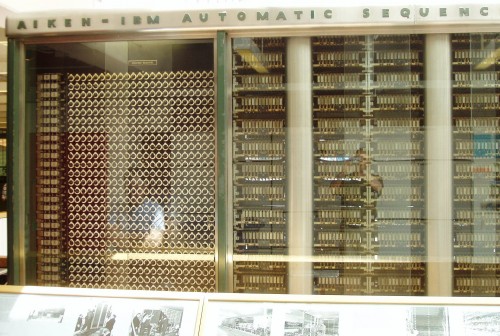There are many amazing women who will surely be considered for the new ten dollar bill: Eleanor Roosevelt, Harriet Tubman, and Rosa Parks among them. But one woman has influenced our daily lives more than any of these trailblazers: Grace Hopper. Without Grace Hopper, you would not be using a computer to read this post, shop online, or email your grandmother. And yet, you have probably never heard of her.
Ask forgiveness, not permission
Before I tell you about what Grace did, let me tell you a little bit about who she was. You may not have heard of her, but you certainly have used a version of this quote from Grace: “If it’s a good idea, go ahead and do it. It’s much easier to apologize than it is to get permission.” No one invented anything great by asking permission. Grace had a vision, and she went for it. And we’re all the richer for her.
Programming in 1944
Grace Hopper was a rear admiral in the United States Navy who was programming computers in 1944. Nineteen forty-four. If you saw the movie The Imitation Game about another brilliant early computer scientist, Alan Turing, you know how primitive computers were in 1944. They took up entire rooms, and their function was largely limited to complex mathematics. That’s it.
Beyond Arithmetic
Grace Hopper had the vision that computers could do more than mathematical calculations. She also knew that to make this vision a reality, people needed a way to give more complex directions to computers. Ones and zeros were fine for math, but to express complex questions and decisions, you need a language. Grace knew that allowing people to use a language like English to express their ideas would empower them to write more complex software. So by 1952, Grace invented the compiler. A compiler takes a more abstract language (e.g., Java, C#, Ruby) and translates it to machine code – those ones and zeros that the computer understands. By inventing the compiler, Grace invented computer programming and revolutionized computer science.
Leadership is a two-way street
Grace was also a director of programming in 1954, a time when women did not hold positions of power, especially in the field we now know as computer science. Grace was a strong leader who mentored generations of computer scientists. She also understood the essence of leadership: “Leadership is a two-way street, loyalty up and loyalty down. Respect for one’s superiors; care for one’s crew.” Grace was active through the 1980s when President Reagan appointed her the rank of Commodore (later Rear Admiral), and Congress approved her working beyond the Navy’s mandatory retirement age. An Act of Congress so she could continue her work. Amazing Grace.
Not good enough
As a woman whose entire career has been in software, I’m proud to see a woman (Ginni Rometty) leading IBM, whose computers Grace Hopper worked on more than 70 years ago. But it’s not enough. I see no more women programmers now than I did 20 years ago, even though I work and have worked for great companies that actively seek out a diverse employee base.
Get your girl geek on
Today, women make up 47 percent of the total U.S. workforce, but are underrepresented in engineering (13 percent) and computer and mathematical sciences (25 percent), according to the National Science Foundation.
Laura Sydell of NPR reported that the percentage of female computer science majors has fallen from its height of about 40 percent in the 1980s to about 17 percent now. Walter Isaacson, author of The Innovators: How a Group of Hackers, Geniuses and Geeks Created the Digital Revolution, said: “When they have been written out of the history, you don’t have great role models.
But when you learn about the women who programmed ENIAC or Grace Hopper or Ada Lovelace … it happened to my daughter. She read about all these people when she was in high school, and she became a math and computer science geek.”
It’s a woman’s world
Young women need to know that programming is a woman’s world. Grace Hopper on the $10 bill will be a reminder and an inspiration – at least until the programming Grace invented makes paper currency a thing of the past.



